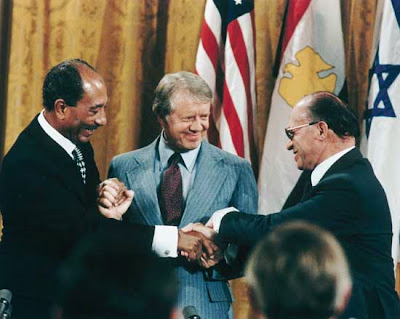By Miri –
According to Aziz Abu Sarah “there are as many definitions [of normalization] as there are Palestinians themselves”. Normalization, according to him, developed into a catch-all argument against any cooperative effort with Israel, ranging from the relations between Arab states and Israel, to having any contact whatsoever with Israelis, or even Jews on an individual level. In order to be able to understand the implication of “normalization” one should have a closer look at the career of this term, including its diverse meanings on different levels.
Normalization between Israel, the PLO and the Arab League
 |
| Anwar Sadat, Jimmy Carter, Menachem Begin, Camp David, 1979 |
The career of the term “normalization” officially began in 1979, when Israel and Egypt signed peace agreements in Camp David. The Egyptian government was heavily criticised by the Palestinian Liberation Organisation (PLO) and other Arab states for engaging in separate peace negotiations with Israel, without reconciling over the Palestinian issue.
Until the Camp David Accords there was a consensus among the member states of the Arab League that Israel should not be treated as a political entity independent of its political actions, and that member states should abstain from having any relationship or ties with the Jewish state. For a long time this position was perceived as strengthening the Palestinian position and as creating a balance between Israel’s military power and the Arabs’ rejection of normalizing relations.
As a consequence of the peace agreements, Egypt was ousted from the Arab League for ten years and started cooperating with Israel in tourism, trade, agriculture, technology and security. After the signing of the Oslo Accords in 1993, Israel and the PLO started cooperating in certain fields, especially in security and the ‘fight against terrorism’. This opened a door for the signing of a peace agreement between Jordan and Israel, which began to cooperate in trade, tourism, and industry.
Supporters of normalization between Israel and the Arab states, see the establishment of ties with Israel outside of the political realm as an opportunity to integrate the Jewish state into the area, and at the same time to develop a formula for partnership (including economic partnership) as an alternative to Israeli-U.S. dominance.
Associations of artists and intellectuals in Arab countries however, especially since the strengthening of the boycott, sanction and divestment (BDS) discourse, largely continue to reject normalization with Israel as long as Israel does not recognize the Palestinian peoples’ right to self-determination.
Normalization within the Palestinian Community
Clearly, within the Palestinian communities in the West Bank and Gaza, and inside Israel, normalization is more complex and takes on very different meanings. The concept started to gain more and more prominence during the 1980s and normalization was most fiercely condemned during the years of the First Intifada. Yet again, since the signing of the Oslo Accords in 1993, and a deepening of Palestinian economic and political dependency on Israel, the situation has changed drastically.
 |
| The Peres Centre for Peace, Jaffa, symbol of lucrative “normalization” |
Despite the obstacles in the peace process, the years after 1993 witnessed a local and international explosion of normalization programmes, which turned out to be extremely lucrative, as any project referencing phrases such as “fostering coexistence” between Israelis and Palestinians had a better chance of being funded. Dialogue groups, youth encounters, joint art and cultural projects were flourishing during these times.
Opponents of normalization criticise those programmes for promoting an image of parity and of symmetry between Israelis and Palestinians. Viewing the problem as one of simply recognising each other’s humanity clearly obfuscates the ongoing oppression, colonisation, and denial of rights, committed by one side against the other. Without the recognition of the asymmetry between the two sides, a project will contribute to cementing the status quo, while at the same time instilling a false sense of “working towards peace”, especially on the Israeli side. Also on an international level normalization projects are commonly being put on display in order to offer a semblance of progress.
With a clear deterioration of the political situation and a parallel strengthening of the BDS movement, normalization debates have resurfaced in the Palestinian community. Opponents of anti-normalization efforts on both sides commonly claim that they play into the hands of the separation policy of the Israeli state: “It is sad that some anti-normalization activists are so focused on protesting ‘normalization’ activities that they have forgotten to show up at protests against growing settlements in Jerusalem”.
Co-Resistance instead of Co-existence
The most productive definition of what constitutes normalization comes from PACBI, the Palestinian Campaign for the Academic and Cultural Boycott of Israel, which describes normalization as
“the participation in any project, initiative or activity, in Palestine or internationally, that aims (implicitly or explicitly) to bring together Palestinians (and/or Arabs) and Israelis (people or institutions) without placing as its goal resistance to and exposure of the Israeli occupation and all forms of discrimination and oppression against the Palestinian people.”
PACBI and many other opponents of normalization do not discourage Palestinian-Israeli efforts in general, but suggest instead to place them within a resistance framework
based on recognition of the fundamental rights of the Palestinian people and on the commitment to resist, in diverse ways, all forms of oppression against Palestinians, including but not limited to, ending the occupation, establishing full and equal rights for Palestinian citizens of Israel, and promoting and advocating for the right of return for Palestinian refugees – this may aptly be called a posture of “co-resistance”
Any other joint effort that ignores the clear assymtry between colonisers and colonised runs the risk of cementing the status quo, and thereby of normalizing the abnormal.
_0.preview.jpg) |
| Co-resistance, Bil’in 2005, Yotam Ronen/Activestills.org |


_0.preview.jpg)

Comment (0)